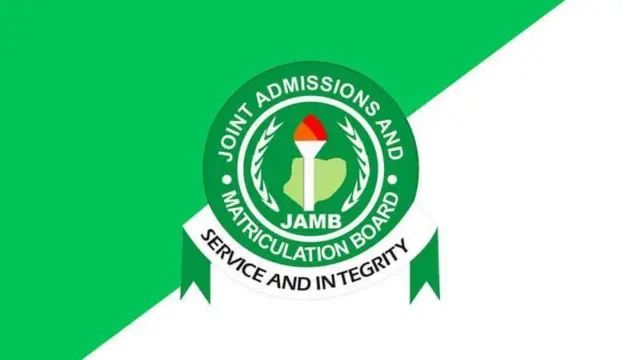Samuel Edet, a high-achieving student who scored 309 in Nigeria’s 2024 JAMB examination, stunned his family and peers this year when his 2025 score plummeted to 162, despite reportedly studying twice as hard. His case is not isolated. Across the country, tens of thousands of students and parents are expressing disbelief and heartbreak over the Joint Admissions and Matriculation Board (JAMB)’s newly released UTME results. The results were delayed for over a week, and listening to the Ministry of Education’s post-JAMB announcement has only deepened public anxiety, as no clear explanation has been offered for the widespread inconsistencies. What was initially viewed as a technical delay has now snowballed into one of the most intense integrity debates in the exam body’s history, raising concerns about fairness, process integrity, and institutional accountability.
Mass Failure and Systemic Distrust
According to JAMB’s own statistics released earlier this week:
- Over 1.94 million candidates sat for the 2025 UTME.
- Only 0.5% scored above 300.
- A staggering 76% scored below 200, raising immediate red flags on test reliability, grading fairness, and technical delivery.
- On social media websites X and Facebook, hundreds of students reportedly scored drastically lower than in previous years, without any change in their academic profiles or preparation methods.
What Happened? Why the Delay?
JAMB delayed the release of results by over 7 days after the UTME ended. The body cited “quality assurance checks,” biometric verification mismatches, and instances of “possible impersonation” or “exam malpractice.” However, for many stakeholders, this explanation falls flat.
Unlike other global CBT (Computer-Based Testing) systems—including SAT, GMAT, and GRE—JAMB provides no detailed mark sheet or question-level feedback to candidates. This lack of transparency means candidates cannot verify:
- What they answered
- What the correct answers were
- How the score was computed
This opacity is at odds with global digital testing standards.
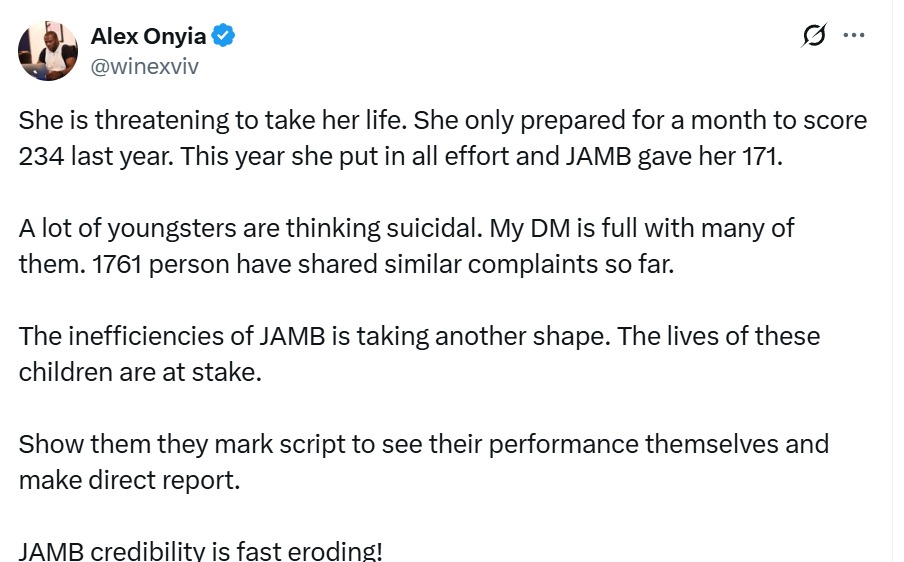
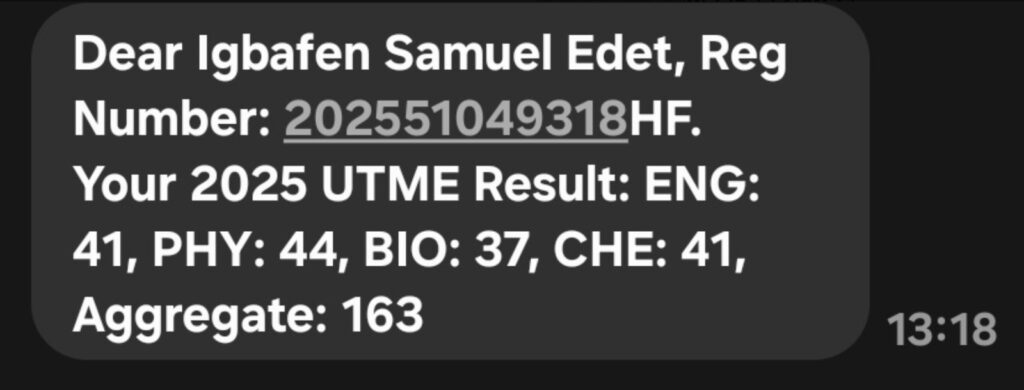
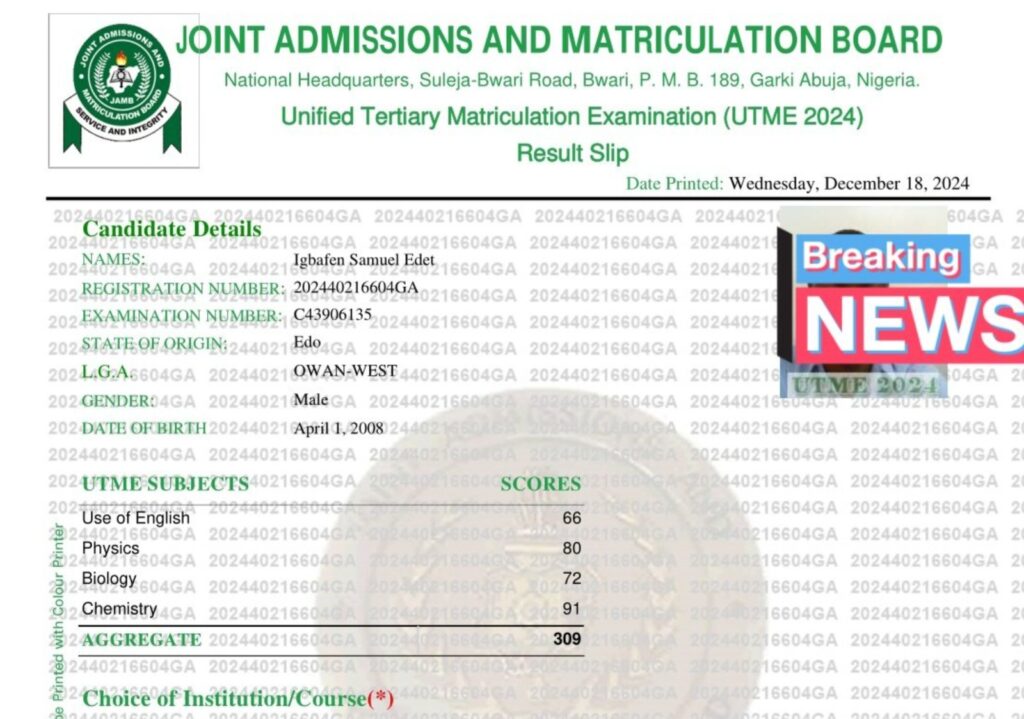
Global Standards: How CBT Exams Work Elsewhere
In established international testing systems:
- Immediate Provisional Scores: Exams like the GMAT or GRE provide candidates with immediate scores for sections like Quant and Verbal upon completion.
- Answer Review & Challenge Mechanism: Most CBT platforms allow candidates to request a review or challenge questions through formal processes (e.g. ETS Score Review service).
- Result Analysis Breakdown: Candidates receive detailed performance analytics—showing time spent per question, strength by topic, and percentile ranking.
- Security Without Sacrifice: Systems use AI proctoring, facial recognition, and live monitoring, yet maintain result transparency.
JAMB’s system, by contrast, demands total trust without offering any verification.
Parents, Students Demand Mark Sheets
Public pressure is now mounting for JAMB to release individual mark-sheets showing:
- Each question attempted
- Candidate’s chosen answer
- Correct answer
- Rationale for the final score
In Samuel Edet’s case, and thousands like his, the question isn’t just about performance, it’s about trust, mental health, and educational opportunity. A drastic drop in scores without cause undermines not only personal effort, but public faith in national institutions.
Legal Action Initiated: A Class Case for Student Rights
In a landmark response to the crisis, Alex Onyia, CEO of EduTech firm Educare and other concerned stakeholders have begun legal proceedings at the Federal High Court to compel JAMB to release full scoring details for candidates.
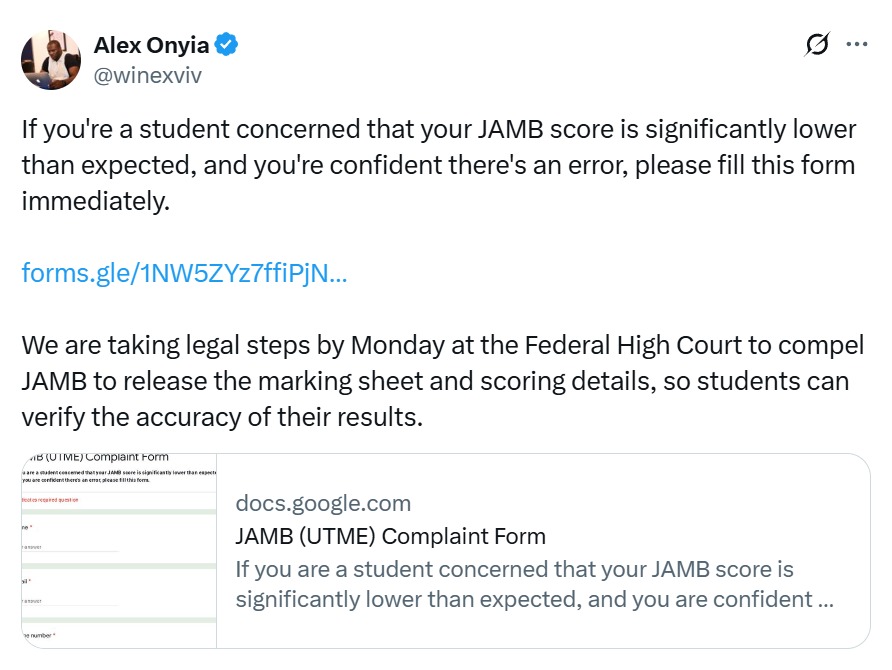
A public complaint form has been created to gather affected candidates across Nigeria:
Fill the JAMB Complaint Form Here
This marks the beginning of a class action effort on behalf of students and their parents who are being encouraged to take a stand, not only for their children but for the integrity of future educational outcomes. If the courts compel JAMB to release answer sheets and grading logic, it would set a national precedent for transparency in public exams.
Parents are being reminded: You are powerful enough. The law, public opinion, and global scrutiny are on the side of fairness.
What Happens When There’s a Conflict?
Currently, JAMB does not provide an independent conflict resolution mechanism. Candidates cannot request a review. There is no audit trail publicly available. This is untenable in the age of digital accountability and AI-powered exams.
The Bigger Issue: Institutional Transparency in Africa’s Education Systems
What’s unfolding isn’t just a case of individual errors, it’s a symptom of deeper structural failings in how public education systems across Africa are administered. When exam bodies operate without transparency or accountability, the burden falls on the very students they’re meant to serve.
Without clear systems for redress, young people are left confused, discouraged, and robbed of opportunities. Trust is not a luxury in education, it is a foundation. And in a digital age where data integrity can be independently verified, continued opacity isn’t just outdated, it’s unacceptable.
If JAMB were a fintech platform, discrepancies like this would demand an audit. In education, the stakes are even higher, futures are being determined. The system must reflect that urgency and care.
What Needs to Change
- Mandate Full Mark Sheets for All Candidates – This should be a non-negotiable right for any digital testing platform.
- Install a Result Review Process – Independent third-party panels should be able to review contested results.
- Public Audit of CBT Software Providers – Who builds and maintains JAMB’s backend? Are the systems stress-tested, updated, and secure?
- Build a Trust Layer – Through independent monitoring, verification, and real-time scoring.
- Parent-Led Advocacy Hubs – Mobilise PTA bodies across Nigeria to formalise exam accountability coalitions.
JAMB must reform or risk eroding the credibility of Nigeria’s tertiary education entry system entirely. For students like Samuel Edet, and the millions investing hope, time, and money into this annual rite of passage, only transparency can rebuild trust.
Nigeria deserves an exam board that works as hard as its students do.


